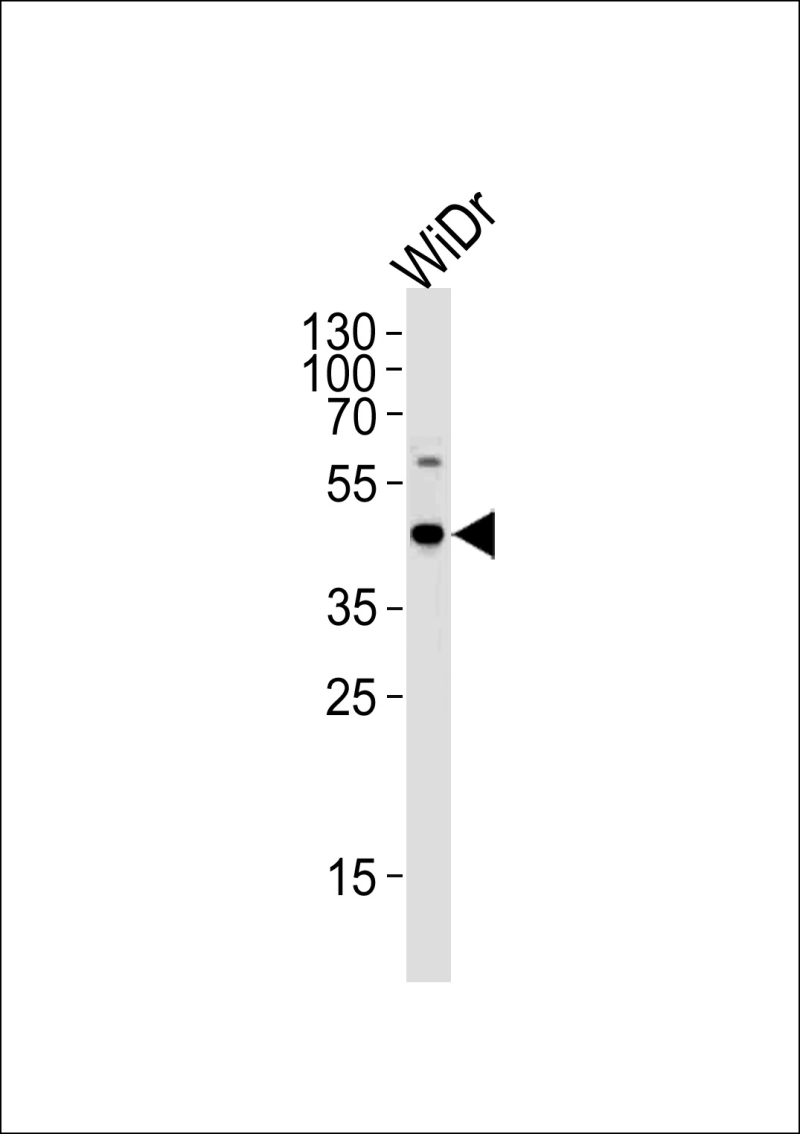

| WB | 1/1000 | Human,Mouse,Rat |
| IF | 咨询技术 | Human,Mouse,Rat |
| IHC | 咨询技术 | Human,Mouse,Rat |
| ICC | 技术咨询 | Human,Mouse,Rat |
| FCM | 咨询技术 | Human,Mouse,Rat |
| Elisa | 咨询技术 | Human,Mouse,Rat |
| Aliases | Protein C9orf72, C9orf72 |
| Entrez GeneID | 203228 |
| WB Predicted band size | 54.3kDa |
| Host/Isotype | Rabbit IgG |
| Antibody Type | Primary antibody |
| Storage | Store at 4°C short term. Aliquot and store at -20°C long term. Avoid freeze/thaw cycles. |
| Species Reactivity | Human, Mouse, Rat |
| Immunogen | This C9orf72 antibody is generated from rabbits immunized with a KLH conjugated synthetic peptide between 396-424 amino acids from the C-terminal region of human C9orf72. |
| Formulation | Purified antibody in PBS with 0.05% sodium azide. |
+ +
以下是3-4条关于 **C9orf72抗体** 的参考文献及其简要摘要:
---
1. **文献名称**:*Reduced C9orf72 protein levels in frontal cortex of ALS/FTD patients with expanded repeats*
**作者**:Waite AJ, et al.
**摘要**:该研究利用特异性抗体(如针对C9orf72的226F抗体)检测患者脑组织,发现携带C9orf72六核苷酸重复扩增的ALS/FTD患者额叶皮质中C9orf72蛋白水平显著降低,提示重复扩增可能导致蛋白功能缺失。
---
2. **文献名称**:*The C9orf72 GGGGCC repeat is translated into aggregating dipeptide-repeat proteins in ALS/FTD*
**作者**:Mori K, et al.
**摘要**:通过特异性抗体(如抗poly-GA、poly-GP抗体)在患者脑组织和细胞模型中检测到由C9orf72重复序列翻译产生的二肽重复蛋白(DPR),证明这些异常蛋白在神经退行性疾病中的病理作用。
---
3. **文献名称**:*Distribution of dipeptide repeat proteins in cellular models and patients with C9orf72 mutations*
**作者**:Schludi MH, et al.
**摘要**:研究使用多种C9orf72抗体(如抗poly-PR抗体)分析DPR蛋白在患者神经元和转基因小鼠中的分布,发现其在细胞核及胞质内异常聚集,并与神经变性相关。
---
4. **文献名称**:*Antibody markers of C9orf72 repeat expansion pathology in ALS/FTD*
**作者**:Freibaum BD, et al.
**摘要**:开发并验证了针对C9orf72扩增产生的RNA病灶和DPR蛋白的抗体,证实其在患者样本和果蝇模型中能特异性标记病理特征,为疾病诊断提供工具。
---
**备注**:以上文献多发表于《Acta Neuropathologica》《Neuron》《Brain》等期刊,聚焦于C9orf72基因突变导致的蛋白异常及抗体在病理机制研究中的应用。
The C9orf72 antibody is a crucial tool in studying the most common genetic mutation associated with amyotrophic lateral sclerosis (ALS) and frontotemporal dementia (FTD). The C9orf72 gene contains a hexanucleotide repeat expansion (GGGGCC) in its non-coding region, which is the leading genetic cause of both ALS and FTD. Antibodies targeting the C9orf72 protein or its pathological features help researchers investigate the molecular mechanisms underlying these neurodegenerative diseases.
C9orf72 antibodies are designed to detect either the normal C9orf72 protein (involved in lysosomal regulation and autophagy) or pathological hallmarks of the mutation, such as reduced protein expression, RNA foci formed by expanded repeats, or dipeptide repeat proteins (DPRs) produced through repeat-associated non-ATG (RAN) translation. Some antibodies target specific regions of the C9orf72 protein (e.g., N-terminal or C-terminal epitopes), while others recognize the GGGGCC repeat expansion or DPR aggregates.
These antibodies are widely used in immunohistochemistry, Western blotting, and immunofluorescence to study tissue samples, cellular models, and animal models. However, challenges remain in antibody specificity, as cross-reactivity with unrelated proteins or inconsistent detection of low-abundance C9orf72 isoforms has been reported. Developing reliable C9orf72 antibodies is critical for advancing diagnostics, understanding disease pathology, and evaluating therapeutic strategies targeting the mutation’s downstream effects. Ongoing research focuses on optimizing antibody validation and exploring their potential as biomarkers or therapeutic agents.
×